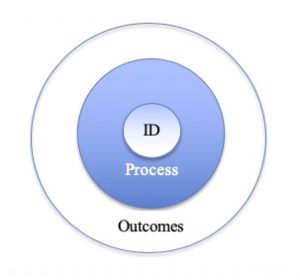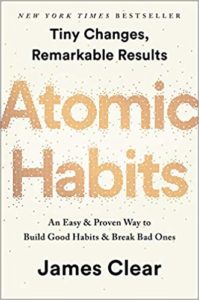Since May, we have been talking about personal productivity, habits, and willpower. Early in my research, I stumbled over James Clear’s excellent book, Atomic Habits: An Easy and Proven Way to Build Good Habits and Break Bad Ones.(#ad) It is an excellent book, and I would highly encourage you to read it. I want to highlight a few of his concepts as we wrap up this segment. Some concepts, like the first one, may be familiar because we’ve seen them in other places.
Win Slowly
Human beings are often irrational in their approach to change. We want massive results and we want these results instantly. In the process we forget about what we should be doing right now in order to achieve those results.
For example, if you can just improve by 1% each day, you will be thirty-seven TIMES better at the end of the year. Note: that is not 37% better. That’s thirty-seven TIMES better (Here is the math:1% better every day for one year. 1.01365 = 37.78).[1]
This concept is not original to James Clear. I have read it in books by Brian Tracy and Darren Hardy. It can be traced at least as far back as W. Edwards Deming as he rebuilt Japan after World War II. The system he constructed was known as Total Quality Management (TQM). This 1% idea is known as Kaizen, which could be translated as continual improvement. The concept was picked up by Toyota and it became part of The Toyota Way.
Kaizen is the magic formula that helps you get rich or lose weight. As Clear wrote, “Habits are the compound interest of self-improvement… It is only when looking back two, five, or perhaps ten years later that the value of good habits and the cost of bad ones becomes strikingly apparent.”[2]
You Need Systems
Clear argued that you don’t need massive effort to be successful. You just need to continue plodding in the right direction. It is true that you need goals. After all, you have to know the outcome that you are trying to achieve. But after you have the goal, you should turn your attention to the system that you have built to get you to the goal. “Goals are good for setting a direction, but systems are best for making progress.”[3]
If you focus on the goal without a system, you’re not likely to get where you are trying to go. On the other hand, if you focus on running the system, the system will take you to the goal.
For example, if the goal is to lead your office and sales, don’t daydream about being a winner. You’re wasting time. Clear recommends the opposite; focus on improving a system that generates more prospects, leads, and appointments than anyone else in your office and the goal will be taken care of as you work your system. He concluded: “You do not rise to the level of your goals. You fall to the level of your systems”[4] (emphasis added).
Identity, not Outcomes
Let’s take a step back. If your goal is to become the best salesman in the office, you should focus on your identity, not on your outcomes. You shouldn’t focus on winning the best salesman award, but on your internal identity of being an incredible salesman.”
Clear offers a chart with three concentric circles.

The inmost circle consists of your identity. The next level consists of the processes or systems that you use. The outer level consists of the outcomes (in our case, the goal to be the best salesman in the office). “Outcomes are about what you get. Processes are about what you do. Identity is about what you believe.”[5] What you believe drives what you do, and consequently, what you get.
The other day as I walked across campus, I struck up a conversation with a salesman who was quite proud of being a salesman. Without my solicitation, he told me that he was the best salesman in his region for a number of years. It was as if he was trying to sell me on himself. I was a stranger, but he couldn’t not sell, even if he was just selling his own reputation. If being a salesman is who you are, you naturally act in ways consistent with how you see yourself.
In contrast, many salesmen just occupy sales positions; they do not see themselves as salesmen. To them, it is just a job. They might want to achieve the goal of being the best salesman in the office, but at the end of the day, they really don’t want to be a salesman.
The non-salesman who wants the prize has to continually motivate himself. On the other hand, the salesman who daily reinforces his identity by doing the things a salesman does naturally improves the process and he is much more likely to achieve his desired outcome. As clear concluded, “Identity change is the North Star of habit change.…the true question is: ‘Are you becoming the type of person you want to become?’ The first step is not what or how, but who.”[6]
What About You?
Who are you? How does that help you achieve your goals?
References
[1] Clear, J. (2018). Atomic habits: An easy and proven way to build good habits and break bad ones. New York: Penguin Publishing Group. (p. 15).
[2] Clear, J. (2018). Atomic habits: An easy and proven way to build good habits and break bad ones. New York: Penguin Publishing Group. (p. 16).
[3] Clear, J. (2018). Atomic habits: An easy and proven way to build good habits and break bad ones. New York: Penguin Publishing Group. (p. 24).
[4] Clear, J. (2018). Atomic habits: An easy and proven way to build good habits and break bad ones. New York: Penguin Publishing Group. (p. 27).
[5] Clear, J. (2018). Atomic habits: An easy and proven way to build good habits and break bad ones. New York: Penguin Publishing Group. (pp. 30-31).
[6] Clear, J. (2018). Atomic habits: An easy and proven way to build good habits and break bad ones. New York: Penguin Publishing Group. (p. 40).
___________

Dr. Darin Gerdes is a tenured Professor of Management in the College of Business at Charleston Southern University.
All ideas expressed on www.daringerdes.com are his own.
This post was originally created for Great Business Networking (GBN), a networking organization for business professionals where Dr. Gerdes is the Director of Education.
FTC Disclosure: When I refer to a book, I often add a link to Amazon (#ad) so you can purchase it easily. I may earn a few cents if you buy it, but I never recommend any books unless they are worth reading.
___________

